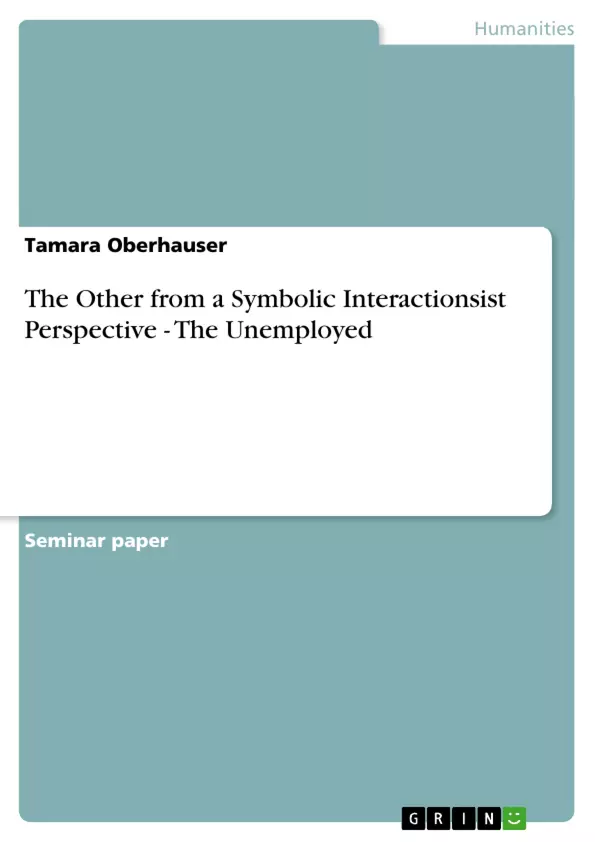In these days the job situation in Germany is seriously bad. More than 4.3 million people are out of work, no matter what level of education they have. The situation in Eastern Germany, where there is an unemployment rate of up to nearly 20% is even worse, particularly for young people under 20, of whom 9.1% are unemployed (cf. Statistisches Bundesamt Deutschland). Although this is mainly a political and economical issue, the social importance of unemployment must not be neglected as realities of jobless people can be drastically altered , especially for those, whose life career was dominated by their work, no matter if they were in high or low positions. As Symbolic Interactionism is in the first place a theory about the everlasting process of social interaction between human beings, the unemployed individual in context to society seems to be worth discussing in this theoretical perspective. So, this essay deals with the unemployed individual in society and their perception of reality during the phase of unemployment related to the main ideas of Symbolic Interactionism found in the book The Social Construction Of Reality. A Treatise in the Sociology of Knowledge by P. Berger and Th. Luckmann first published in 1966. This book serves as aconception of the sociological theory of Symbolic Interactionism and its theoretical development. The first chapter summarizes the major points of Symbolic Interactionism and chapter two deals with the idea of the “Other” within this theoretical approach. The third chapter examines the unemployed individual relating to their objective and subjective reality. Finally, chapter four presents the consequences of reality perception by unemployed individuals through social interactions and their relevance to society.
Inhaltsverzeichnis (Table of Contents)
- Introduction
- 1. Symbolic Interactionism - A brief overview
- 2. The "Other"
- 3. The unemployed individual
- 3.1 The unemployed in objective reality
- 3.2 The unemployed in subjective reality
- 4. Conclusion
Zielsetzung und Themenschwerpunkte (Objectives and Key Themes)
This essay examines the perception of reality by unemployed individuals in Germany through the lens of Symbolic Interactionism. It aims to understand how unemployment affects individuals' experiences of social reality and how these experiences are shaped by their interactions with others.
- The concept of Symbolic Interactionism and its application to understanding social reality.
- The role of the "Other" in shaping individual identity and perception.
- The impact of unemployment on the objective and subjective reality of individuals.
- The social construction of reality and its relevance to the experience of unemployment.
- The importance of social interaction in shaping individual perceptions and the dynamics of social reality.
Zusammenfassung der Kapitel (Chapter Summaries)
- Introduction: This chapter provides context for the study, highlighting the high unemployment rates in Germany, particularly for young people, and emphasizing the need to consider the social implications of unemployment beyond economic factors. It introduces Symbolic Interactionism as a framework for analyzing the experience of the unemployed in society.
- 1. Symbolic Interactionism - A brief overview: This chapter introduces the core principles of Symbolic Interactionism, focusing on its focus on social interaction, the creation of personal identity through interactions, and the importance of language in shaping meaning and understanding. It introduces the concepts of "externalization," "objectivation," and "internalization," as well as the role of the "Self" (comprised of "I" and "Me") in shaping identity through interaction.
- 2. The "Other": This chapter explores the evolution of the concept of the "Other" in Symbolic Interactionism. It examines the contributions of key thinkers like Jane Addams, Cooley, Mead, and Goffman, highlighting different perspectives on the "Other" as a social construct and the importance of understanding others' perspectives through taking their role.
- 3. The unemployed individual: This chapter begins to analyze the experience of unemployment from a Symbolic Interactionist perspective. It introduces Berger and Luckmann's concept of "multiple realities" and the "ordered reality" of everyday life, and raises questions about how unemployment leads individuals to become the "Other" in society. The chapter sets the stage for examining both the objective and subjective realities of unemployment.
- 3.1 The unemployed in objective reality: This chapter explores how objective reality is shaped by social interaction, habitualization, and institutionalization. It focuses on the institution of work and how the duty to work is embedded in societal norms and expectations. It examines how unemployment contradicts these established norms and how individuals who are out of work may be perceived as deviating from the institutional order.
Schlüsselwörter (Keywords)
Symbolic Interactionism, social interaction, social reality, the "Other," identity, unemployment, objective reality, subjective reality, socialization, institutionalization, habit, deviance, social construction.
Frequently Asked Questions
How does this essay view unemployment?
The essay examines unemployment through the lens of Symbolic Interactionism, focusing on how it alters an individual's perception of social reality and their identity in society.
Which sociological book serves as the theoretical basis?
The essay is primarily based on "The Social Construction of Reality" by Peter Berger and Thomas Luckmann (1966).
What is the role of the "Other" in this context?
It explores how unemployed individuals become the "Other" in a society where work is a central institutional norm, leading to a shift in social interactions.
What is the difference between objective and subjective reality for the unemployed?
Objective reality refers to societal institutions and norms (like the duty to work), while subjective reality is the individual's personal internal experience and identity during unemployment.
Why is language important in Symbolic Interactionism?
Language is seen as the primary tool for shaping meaning, understanding social reality, and constructing personal identity through interaction with others.
- Quote paper
- Tamara Oberhauser (Author), 2003, The Other from a Symbolic Interactionsist Perspective - The Unemployed, Munich, GRIN Verlag, https://www.grin.com/document/35291



